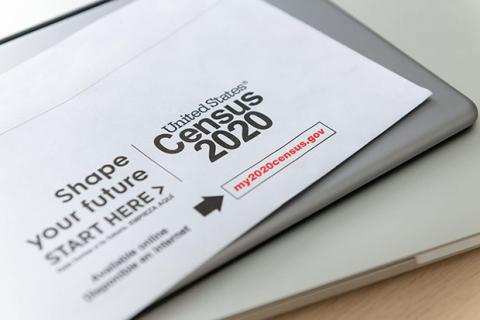
April 1, 2020 is Census Day! You may have questions about why it matters that you complete the census, which takes place once every 10 years.
We turned to University Libraries' Rosan Mitola, interim head of educational initiatives, and Chelsea Heinbach, teaching & learning librarian, to answer some questions about the census, how your information is protected, and how completing the census will impact you, your campus, and the community.
Why does the census matter to college students?
The census impacts college students directly in many ways. Information taken from the census is used to help determine federal student loans and Pell grants. It affects campus funding, which impacts things like campus improvements. It’s also used to make decisions regarding legislation that affects students.
It also determines how your voice will count in elections. Data collected during the census is used to determine Congressional representation and how federal funds are spent.
Other things that are affected include how federal funding is allocated to things that matter to your family and community, including school lunches, Medicare, highway planning and construction, Head Start, natural disaster planning, and health and social services like hospitals.
As members of our communities work together to limit the spread of coronavirus, it is especially important to ensure health services in our fast-growing city are properly funded.
When can I fill out the Census?
April 1 is officially Census Day, but census surveys have already started landing in mailboxes and the online form is also available. If you have not taken the census yet, Census Day is the perfect day to do so!
What does answering entail?
The census counts the population in all 50 states, the District of Columbia, and the five U.S. territories.
It’s actually a pretty quick questionnaire and is available in 13 languages, including English and Spanish. You’ll be asked basic questions about who you are, where you live, your sex, and date of birth. If you’d like, you can view the Census Bureau’s sample census to see exactly what questions will be asked.
Who gets counted in the census?
The 2020 census counts everyone living in the United States, including non-citizens. It is mandated by the U.S. Constitution and is conducted by the U.S. Census Bureau, a nonpartisan government agency.
What if where I am living right now is temporary?
That’s OK! The census is a snapshot in time to see where people are living on a particular day. When you complete your census you should count yourself at the place where you are living and sleeping most of the time as of April 1, 2020.
Is the Census safe?
Yes, the census is safe! Your personal responses and information are protected by law and the Census Bureau has a cybersecurity team that monitors and protects information filled out online. The Census Bureau is bound by Title 13 of the U.S. Code to keep responses confidential. Under this law, the Census Bureau cannot release any identifiable information about you, your home, or your business, even to law enforcement. Additionally, the 2020 Census will not ask whether you or anyone in your home is a United States citizen, so please ensure those folks are counted!
How do I complete the census?
The census can be completed online, over the phone, and through the mail. In mid-March, the Census Bureau sent invitations to homes around the nation. Once you receive your invitation, you can take the census. If you aren’t sure if you received it yet, rest assured that multiple invitations will be sent to each household. These invitations will include a unique 12-digit Census ID.
The UNLV University Libraries also have a 2020 Census Resource Guide with more information, links to the Census Bureau, and videos.


